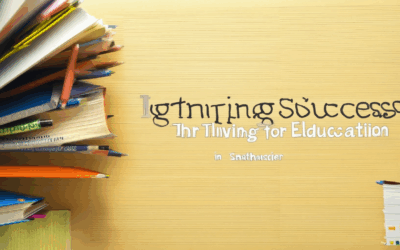Academic success is a cornerstone of future achievements, and accessing the right resources can significantly empower students to thrive in their educational journey. Navigating the complexities of higher education often feels overwhelming, but with the right academic guidance resources, students can streamline their path to success. These resources act as tools designed to aid in decision-making, time management, and achieving long-term goals. Whether it’s understanding academic advising styles or exploring approaches to stay on track, these resources provide invaluable support. From improving grades to opening doors for better career opportunities, the role of academic guidance extends far beyond academics, fostering personal growth and self-confidence. In this comprehensive guide, we delve into the essential academic guidance resources, the roles of academic advisors, and how these elements collectively contribute to student empowerment. By understanding the significance of these resources and how they function, students can unlock their potential and pave the way for a brighter future.
Key Takeaways
– Academic Advisors Unlock Your Potential: They guide you in choosing courses and majors that align with your career goals.
– Streamline Your Path: With expert advice on course selection and progression, they help you stay on track for degree completion.
– Crush Career Confusion: By exploring career pathways and offering job prep tips, advisors bridge the gap between academia and professional success.
– Excel Beyond Academics: Their insights on time management and study habits empower you to balance school with other pursuits.
– Ace Research and Integrity: Get tailored guidance on research opportunities and citation basics to excel in academia.
– Secure Your Future: Advice on internships, scholarships, and financial aid ensures you’re prepared for life after graduation.
– Succeed Mentally and Emotionally: Access referrals to mental health resources and self-care strategies for overall well-being.
– Career Clarity and Readiness: They connect you with internships and help you build a competitive resume for the job market.
– Leverage Campus Resources: Advisors point you to essential services like tutoring and wellness programs to support your growth.
– Thrive in Grad School: Guidance on applications and deadlines helps you pursue advanced studies with confidence.
By utilizing these resources, you can achieve long-term success. Visit Enroll Maven for more tools to enhance your academic journey!
Academic Support Resources
Academic support resources are designed to enhance students’ academic experiences, providing them with tools, programs, and services to succeed both in and out of the classroom. These resources aim to address a variety of needs, from overcoming academic challenges to improving overall well-being.
- Tutoring Services: Access to one-on-one or group tutoring sessions for specific subjects, often available through university or college centers.
- Study Skills Development: Workshops, guides, and resources focused on effective studying techniques, time management, and note-taking strategies.
- Mentorship Programs: Opportunities to connect with mentors who can offer guidance, advice, and support throughout the academic journey.
- Writing Centers: Facilities or online platforms where students can receive feedback on their written work, improve their writing skills, and enhance their academic performance.
- Academic Advising: Meetings with academic advisors to discuss course selection, degree plans, and academic progress.
- Retention Programs: Initiatives designed to help students stay motivated, engaged, and on track to graduate, often including workshops and support groups.
- Resources for Students with Disabilities: Accommodations, services, and technologies available to support students with diverse learning needs.
- Online Learning Platforms: Digital resources, video lectures, and interactive tools that provide flexible learning opportunities for students.
- Competitions and Scholarships: Opportunities to compete in academic challenges and apply for financial aid to support educational pursuits.
- Support for Graduate and Professional Students: Specific programs and resources tailored to the unique needs of advanced learners.
What is the Highest Salary for an Academic Advisor?
The salary for an academic advisor can vary significantly depending on factors such as experience, education level, and the type of institution they work for. According to recent data, the average annual salary for academic advisors ranges from $40,000 to $120,000, with the higher end often associated with senior positions or those working in private institutions.
Average Salaries by Role and Experience
- Entry-Level Advisors: Around $45,000 to $65,000 annually
- Mid-Level Advisors: Approximately $60,000 to $90,000 annually
- Senior Advisors: Often earn between $80,000 and $120,000 per year
Factors Influencing Salary
Several factors contribute to the variation in academic advisor salaries:
- Education Level: Advisors with advanced degrees (e.g., PhD) often command higher pay
- Institution Type: Private universities and colleges typically offer higher salaries compared to public institutions
- Experience: More experienced advisors tend to earn significantly more
- Location: Urban areas and high-cost regions generally have higher salaries
How to Maximize Earnings
To increase your earning potential as an academic advisor, consider:
- Pursuing advanced certifications or degrees
- Gaining leadership roles within your institution
- Exploring opportunities in specialized fields like academic counseling or career coaching
- Staying updated on industry trends and seeking promotions
Competitors and Resources
Enroll Maven offers valuable resources and tips for academic advisors looking to advance their careers. Explore their website for more information on professional development and academic advising best practices:
Visit Enroll Maven
Additionally, platforms like ZipRecruiter and Indeed provide detailed salary guides and job listings for academic advisors. These resources can help you understand market trends and negotiate better compensation packages.
What is the Meaning of Academic Guidance?
Academic guidance refers to the process of providing support and resources to students to help them achieve academic success. It involves helping students understand their responsibilities, develop effective study habits, and make informed decisions about their education and future careers. This type of guidance is often delivered by teachers, counselors, mentors, or specialized services like those offered by Enroll Maven .
Key Components of Academic Guidance
- Understanding Academic Responsibilities :
Academic guidance helps students grasp the expectations and requirements of their academic journey. This includes knowing course prerequisites, meeting deadlines, and maintaining satisfactory progress toward degree completion. - Developing Study Habits :
Effective study techniques, time management, and organization are crucial for academic success. Guidance programs often include strategies to help students optimize their learning processes. - Navigating Course Selections :
Students may need assistance in choosing courses that align with their interests, career goals, and academic requirements. This ensures they stay on track for graduation and prepare for their future careers. - Exploring Career Pathways :
Academic guidance also extends to helping students explore career options, understand job market demands, and prepare for the workforce. This includes internships, networking opportunities, and resume building workshops.
Additional Resources for Academic Success
To complement academic guidance, platforms like Enroll Maven offer valuable resources such as articles, video tutorials, and forums. These tools provide students with practical advice on topics like test-taking strategies, college applications, and financial aid. By leveraging these resources, students can enhance their academic performance and confidence.
Resources Your Academic Advisor Can Assist You With
An academic advisor plays a pivotal role in supporting students beyond academics, providing a wide range of resources to ensure your success. Here’s a breakdown of the key resources they can assist you with:
- Course Selection and Planning :
Your advisor can help you choose courses aligned with your interests and career goals, ensuring you stay on track academically. - Major Declaration and Exploration :
They assist in exploring potential majors and minors, helping you find the right path for your future. - Academic Planning and Progression :
Whether it’s creating a four-year plan or addressing academic challenges, advisors guide you toward achieving your goals. - Time Management and Study Habits :
Tips and strategies for balancing coursework, extracurricular activities, and personal life are often provided. - Study Skills Development :
Resources and guidance on improving note-taking, time management, and exam preparation techniques. - Research Guidance :
Assistance with finding research opportunities, understanding academic integrity, and navigating citation requirements. - Internship and Job Preparation :
Insights into securing internships and preparing for the job market, including resume building and interview tips. - Scholarship and Financial Aid :
Information on available scholarships, grants, and financial aid options to support your education. - Mental Health and Well-being :
Referrals to counseling services, stress management techniques, and self-care strategies. - Career Counseling and Exploration :
Help with exploring career paths, understanding job markets, and preparing for professional development. - Connecting with Campus Resources :
Directions to university services like tutoring centers, libraries, and wellness programs. - Graduate School and Fellowship Applications :
Guidance on applying to advanced degrees or fellowships, including application processes and deadlines.
By leveraging these resources, you can maximize your academic journey and set yourself up for long-term success. For additional tools and tips, visit Enroll Maven to explore tailored resources designed to enhance your educational experience.
Role of the Academic Advisor in Guidance
The academic advisor plays a pivotal role in guiding students through their academic journey, ensuring they stay on track and make informed decisions. Here’s a breakdown of their responsibilities:
Academic Guidance
- Assesses students’ progress toward meeting program learning outcomes.
- Discusses obstacles or challenges hindering academic performance.
- Encourages engagement in developmental activities to enhance employability.
- Provides academic references and resources for improvement.
Career Advise
- Assists students in exploring career pathways aligned with their interests and strengths.
- Helps navigate internships, job placements, and professional development opportunities.
- Offers insights into industry demands and necessary skills for career success.
Personal Development
- Supports students in developing essential life skills like time management and stress reduction.
- Connects students with campus resources such as tutoring services and workshops.
- Fosters a supportive environment for academic and personal growth.
Collaboration and Advocacy
- Works closely with faculty to monitor student progress and provide timely interventions.
- Acts as a student advocate, addressing concerns and promoting equitable access to educational opportunities.
- Maintains confidentiality and builds trust to encourage open communication.
Support Services
- Refers students to mental health resources and academic support programs.
- Collaborates with academic departments to streamline credit transfers and course registration processes.
- Ensures students receive personalized attention and tailored advice to meet their unique needs.
By providing comprehensive guidance, academic advisors empower students to thrive academically, professionally, and personally. Their role is integral to fostering student success and ensuring students are well-prepared for the challenges ahead.
Enroll Maven offers valuable resources and tips for students navigating their academic journey. Explore their platform for additional insights and guidance.
What Does a Dedicated Academic Advisor Do?
An academic advisor plays a pivotal role in guiding students through their academic journey, ensuring they make informed decisions aligned with their goals and interests. Their primary responsibilities revolve around helping students navigate their coursework, select appropriate majors, and meet degree requirements efficiently.
- Academic Planning: Assist students in creating a structured academic plan tailored to their individual needs, helping them choose courses that align with their career aspirations and academic interests.
- Major Selection: Guide students in selecting majors and minors, providing insights into program requirements, potential career paths, and related fields of study.
- General Education Requirements: Help students understand and complete general education prerequisites, ensuring they stay on track without enrolling in unnecessary courses.
- Career Counseling: Offer career-related advice, connecting academic choices to job market demands and professional development opportunities.
- Scheduling Assistance: Assist with course scheduling, helping students balance their workload and avoid conflicts with important commitments.
- Academic Policies and Procedures: Provide guidance on academic policies, deadlines, and procedures, helping students avoid pitfalls and resolve issues effectively.
- Exploring Graduate School and Internships: Encourage students to explore advanced study options, research opportunities, and internships that complement their academic path.
- Monitoring Progress: Regularly monitor students’ academic progress, offering early intervention for those who may be struggling and celebrating achievements along the way.
How Can a Dedicated Academic Advisor Help Students?
Dedicated academic advisors bring significant benefits to students, acting as a central point of contact for academic and career-related matters. Here’s how they contribute to student success:
- Personalized Attention: Offer one-on-one support, ensuring students feel valued and supported in their academic journey.
- Academic Success Support: Provide resources and strategies to enhance academic performance, such as study habits, time management, and exam preparation techniques.
- Campus Resource Navigation: Connect students with essential university resources, including libraries, labs, and support services, to facilitate their academic growth.
- Career Exploration: Help students discover their strengths and interests, guiding them toward majors and careers that match their passions.
- Professional Development: Offer advice on building resumes, preparing for interviews, and developing soft skills crucial for professional success.
- Transition Support: Assist students transitioning into college, helping them adapt to university life and academic expectations.
- Extracurricular Involvement: Encourage involvement in clubs, organizations, and activities that enrich students’ personal and professional growth.
In conclusion, a dedicated academic advisor serves as a vital ally for students, providing guidance, support, and resources to help them thrive academically and prepare for their future careers. Their expertise ensures students stay on track, make informed decisions, and leverage every opportunity available to succeed.
For more insights and tools to help students navigate their academic journey, visit Enroll Maven .









0 Comments